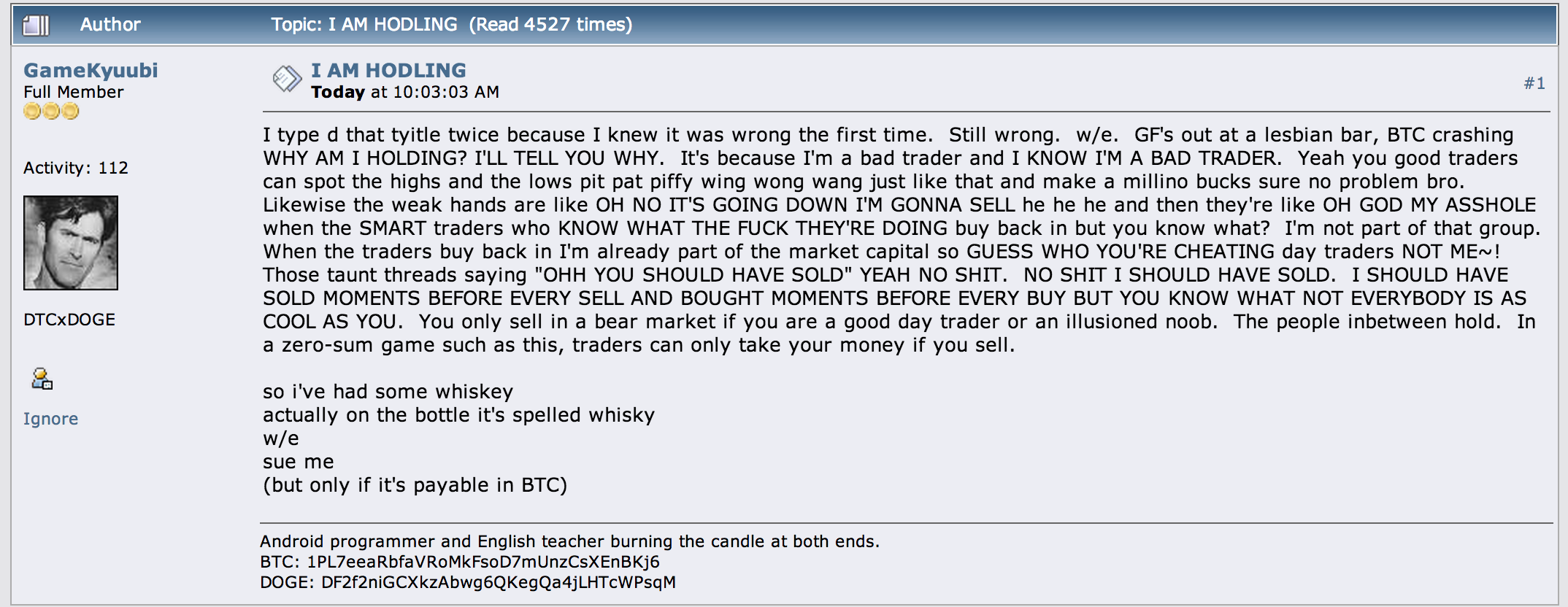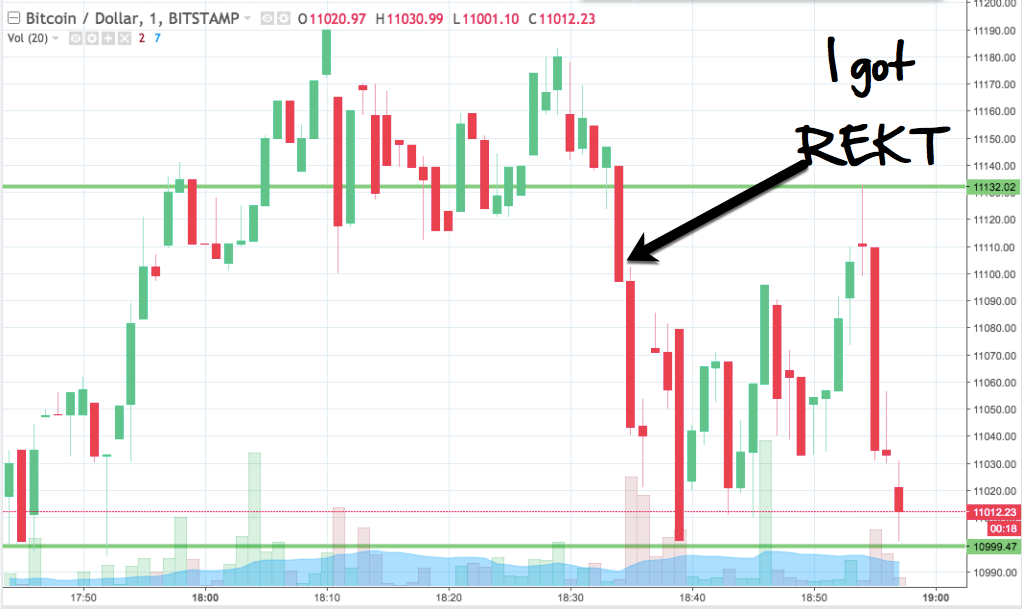What does HODL mean? 7 top bitcoin slang terms explained
If you’re new to bitcoin and other digital assets, you have probably noticed these communities have a language of their own.
From FUD to whale, understanding bitcoin slang can give any investor community clout during the next bitcoin bull run. We’ve compiled a list of definitions starting with perhaps the most iconic term of all: "HODL." Let’s begin!
The meaning of HODL
HODL is one of the most frequently used slang terms in the bitcoin community. Some people occasionally say, incorrectly, that HODL is an acronym for “hold on for dear life.” While that acronym is accurate, it’s a bit of revisionist history. It turns out, HODL actually originated as a drunken misspelling of the word “hold.”
Long ago, an enthusiastic Bitcointalk forum user by the name of GameKyuubi posted a semi-intelligible tirade (after a few drinks, he admits) about an unfortunate bitcoin trading decision he made during a volatile price rally in December 2013.
In his post, he wrote, “I AM HODLING” in an effort to communicate that from that point on, he would simply hold his bitcoin instead of selling, no matter the market conditions. Within hours, the typo found its way onto every bitcoin community channel in the form of memes and GIFs, catapulting HODLing into crypto-vernacular history.

Today, HODLing is a euphemism for what other investors may equate to a buy-and-hold strategy in other asset classes. To this day, bitcoin’s long-term supporters have used the term as a rallying cry to remind the community to stay strong, even during the most volatile price movements. As GameKyuubi wrote, “In a zero-sum game such as this, traders can only take your money if you sell.”
HODLing plays a special role at Casa, as we see bitcoin having a greater impact on each individual that owns it, and society as a whole. Our team builds tools to help you HODL. And we work to help set the industry standards for bitcoin security and user-friendly self-custody to ensure your bitcoin stays safe and in your hands — not anyone else’s. Learn more about how you can use our battle-tested multi-key vaults here.
Though HODLing is one of the more important bitcoin slang terms to know, it’s only the tip of the iceberg of jargon every bitcoin investor should know.
Other top crypto slang terms to add to your list
FUD: Or “Fear, Uncertainty, and Doubt” is a simple term that describes the emotions that can be felt by investors during more volatile market movement time periods, when negative mainstream news cycles occur, and other uneasy moments surrounding the bitcoin ecosystem. FUD is constantly circulating on social media, much to the chagrin of bitcoin believers, and in many cases, it’s used to describe narratives that have long been debunked.
Diamond hands: HODLing takes a level of commitment. The bitcoin community tends to illustrate this commitment and fortitude by describing the strength of one’s hands. Someone with a low risk tolerance who parts with their assets at the first sign of FUD may be described as having “paper hands” or “lettuce hands.” The implication is that these materials are not sturdy.
Diamonds, on the other hand, are much harder. Among minerals, they score a 10, the highest possible level, on the Mohs hardness scale. Someone with “diamond hands” is largely undeterred in their conviction. Pressure makes diamonds. If you HODL bitcoin through thick and thin, others may describe you having diamond hands.
Rekt: Originating from the word "wrecked.” Used when referencing an investor(s) that has made a bad trade or has, in general, lost a lot of coins in some way. Like when selling their bitcoin right before the price increases significantly. You would say, “They got rekt by selling early.” The term was adopted from the digital gaming world, where it was used regularly to denote a savage loss by a player.

Stacking sats: “Sats” comes from the term “satoshis,” derived from Satoshi Nakamoto, bitcoin’s elusive creator(s). “Sats” refers to the smallest fraction of a bitcoin that can be sent when an onchain transaction is made, which is approximately equal to 0.00000001 of a bitcoin. “Stacking sats” is a term commonly used to describe the act of regularly accumulating bitcoin—particularly in smaller increments—by buying, earning, or mining.
To the moon: When the price of bitcoin is steadily increasing over a shorter period of time, investors regularly use the term "To the moon" to describe its upward trend.

Whale: Referring to a large bitcoin HODLer/investor. “Whales” typically hold a substantial amount of bitcoin. Thus, when a whale buys or sells bitcoin, its influence can be so strong as to make the market price move significantly upward or downward.

Whether you are stacking sats in hopes of becoming a whale, straight-up HODLing, or watching for bitcoin to head to the moon, we hope this guide gives you a bit more clout in your next conversation.
Get security news delivered to your inbox
Security is the art of staying ahead. Our Casa Security Briefing provides weekly updates about privacy, security, and other news. Sign up below to receive future editions.
Read more



